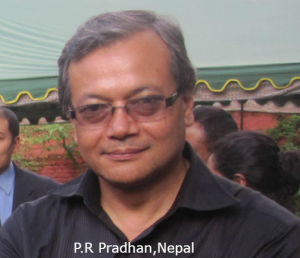– Pushpa Raj Pradhan
Chief Editor
People’s Review weekly, Nepal

Reports have appeared in different media that the country’s second international airport, Gautam Buddha International Airport (GBIA) and the third international airport, Pokhara International Airport (PIA) have not been able to operate flights due to the Indian non-cooperation.
The two international airports were constructed by Nepal taking a heavy amount of foreign loans as the only Tribhuvan International Airport was unable to bear the air-traffic loads.
Presently, GBIA is unable to operate international flights as India didn’t allow permission to operate the Instrument Landing System (ILS).
International flights have been halted in the airport citing unfavorable weather conditions as India did not give consent to operate the ‘ILS system’.
International flights here have been affected due to poor visibility following thick fog in winter.
General Manager of the Gautam Buddha International Airport Govinda Prasad Dahal confirmed that Himalayan Airlines has suspended its flights since December 20 and Jazeera Airways since December 2. ILS has been installed at the airport but it is not brought into use. The ILS is a radio navigation system which helps aircraft in landing during nighttime and inclement weather condition.
For years, Nepal is demanding additional aircraft entry routes via Janakpur, Bhairahawa, Nepalgunj and Mahendranagar but India has not responded to Nepal’s request. India has allowed only the Simara entry route, which is already facing heavy traffic and is also not feasible for the operation of international flights from GBIA.
It will take an additional seven to ten minutes more time for the aircraft to approach Bhairahawa than Kathmandu. Due to the Indian hurdles, both the new international airports are facing problems in the operation of international flights.
Our political leaders claim that we have special relations with India, perhaps, this is a glaring example of the special relations between Nepal and India?
Frankly saying, India is playing an active role in destabilizing Nepal. Indians are always performing the role of micro-management.
The Indian idea is to keep Nepal permanently a poor country so that it would be able for bullying Nepal always. It is due to India, Nepal has not been able to become economically self-reliant.
Encroachment of the international borders, migration of its population to Nepal, and attempts to split Nepal’s Tarai districts with the plan of annexing Nepali territory into India are the vested interests of the Indian rulers. This is why the Indians are keeping the Nepal-India border open.
Indians don’t like international cooperation and support for Nepal. On the other hand, India is occupying Nepal’s potential water resources by giving warnings to the Nepali leaders in the government. Nepal’s outgoing prime minister Sher Bahadur Deuba publicly remarked that if allowed any third countries to construct Nepal’s hydropower projects, India will not buy hydropower produced by such third countries constructed or invested projects.
Budhi Gandaki, west Seti, and Upper Karnali are very potential hydropower projects.
Nepali political leaders are handing over one after another hydropower projects to India.
Arun 3 was the project to be constructed from the investment of the World Bank, Japan, and Germany, among others. The project was cancelled and later it was handed over to the Indians.
Nepal had handed over the Budhi Gandaki Project to the Chinese company twice. Again, the deal was scrapped without any reason. It is sure, our leaders, either they are from the Nepali Congress or the communist parties, all are preparing grounds to hand over the project to India.

From our bureaucrats to the political leaders, they are heavily dominated by the Indian mindset that Nepal would become rich by selling electricity to India. The reality is that Nepal is exporting electricity to India at 8 rupees per unit, which is below the production cost and importing electricity from India at above 19 rupees. If our bureaucrats and leaders deny exporting electricity to India and supply it to locals for house holding purposes and also supply electricity to the local industries at a subsidized rate, surely, Nepal could reduce import of the petroleum products and also produce industrial products at cheap prices.
# Text courtesy: The People’s Review weekly dated January 11, 2023: Ed. Upadhyaya.
